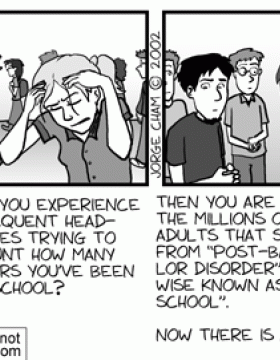Identify the issue
Career Wise Menu
Understand Yourself: Overview
Graduate school, and the world, are full of potential stressors. And, as we articulated in the Understand the Context section of the Coach, there are many elements of your local and societal environments that introduce obstacles for diverse women in STEM. But all people experience or respond to a singular situation or hurdle the same way. You may have noticed, for instance, that having to write another draft of a paper might upset you but does not spark the same reaction in a classmate. In the same vein, you might really enjoy a team competition whereas your teammate would rather hide.
If something is a problem for you, “you” play a role. “You” are reacting to someone or something, allowing them to get in your way, or actually contributing to or perpetuating the stressor with your thoughts, feelings, and behaviors. Understanding yourself is part of what differentiates interpersonal and personal problem-solving from technical problem-solving. An essential part of assessing a problem is identifying how your thinking and feeling styles and your unique preferences influence your response to the situation.

Academic Resilience
The purpose of building resilience is to fortify yourself with coping tools and supports that will serve you for the long term. Expanding your resilience assets will help you sustain your interest, motivation, and success in pursuing your goals and fulfilling your passions.
Learn more
Coping and Self-Efficacy
Coping is any effort you make to alleviate stress, control your environment, or overcome something you find threatening. Self-efficacy is your belief about your ability to perform a particular behavior successfully; it is a type of self-confidence. Your patterns of dealing with problems and your confidence in how…
Learn more
How You Think
Your thinking habits affect how you feel and how you respond to different situations. Thinking refers to your internal dialogue about anything that comes up in your moment-to-moment, day-to-day life. Unless you stop yourself, it’s easy to get caught up in debilitating patterns of thinking.
Learn more
Emotional Styles
Your emotional patterns contribute to your successes or setbacks and even your health. You may sometimes let your feelings drown out rational thinking or let your emotions get the best of you.
Learn more
Your Stress Triggers
When stress levels get too high, your relationships, focus, productivity, and well-being can all be affected negatively. Recognizing what sets off your stress reactions can help you better understand the “you” in the situation.
Learn more
Career Goals and Motivation
Your goals and beliefs about what is important are related to how you act, react, and achieve. Focusing on your goals and passion helps you assess the elements and importance of a problem.
Learn more
The Impression You Make
The impression you make on those who are essential to your academic success matters from the first to the last day of graduate school. Self-presentation requires constant monitoring, as mutual impressions can contribute to positive or troubled relationships.
Learn more
Your Personality and Preferences
Every exchange between two or more people involves a complex mingling of two distinct personality styles. Understanding how your personality and styles fit your environment and others in it is part of assessing the problem.
Learn more
Mental Health and Wellness
Navigating graduate school is demanding and stressful for many students. Paying attention to your level of stress and anxiety and watching for signs of depression are critical responsibilities you have to yourself.
Learn more
What You Want in an Advisor
Are you getting the type of support you need from your advisor? Before you decide if you are getting the support you need, it is important to understand what exactly an advisor’s role is supposed to be.
Learn more
What You Want in a Mentor
A mentor can help support you in your academic, professional, and personal development. Mentors often provide more emotional support and individualized attention than advisors. You can learn to understand what you need specifically and how you can find that support.
Learn more
Stereotype Threat
The way you think other people perceive you as a woman or member of a minority group can cause anxiety and influence your actual performance in graduate school. If your gender, race, or ethnicity is underrepresented in your program, you might experience stereotype threat.
Learn moreIdentify The Issue Side Menu
- Overview
- Recognize Sexism
- Recognize Microaggressions
- Family-Friendly Policies
- University Resources
- Online Resources and Supports
- Challenges Faced by Women of Color
- Challenges Faced by First-Generation Students
- Challenges Faced by Sexual and Gender Minorities
- Challenges Faced by International Students
- Academic Generations
- Expectations for Graduate Students
- Stakeholders
- Sexual Harassment
An Arizona State University project, supported by the National Science Foundation under grants 0634519, 0910384 and 1761278
Any opinions, findings, and conclusions or recommendations expressed in this material are those of the authors and do not necessarily reflect the views of the National Science Foundation. © 2021 CareerWISE. All rights reserved. Privacy | Legal


